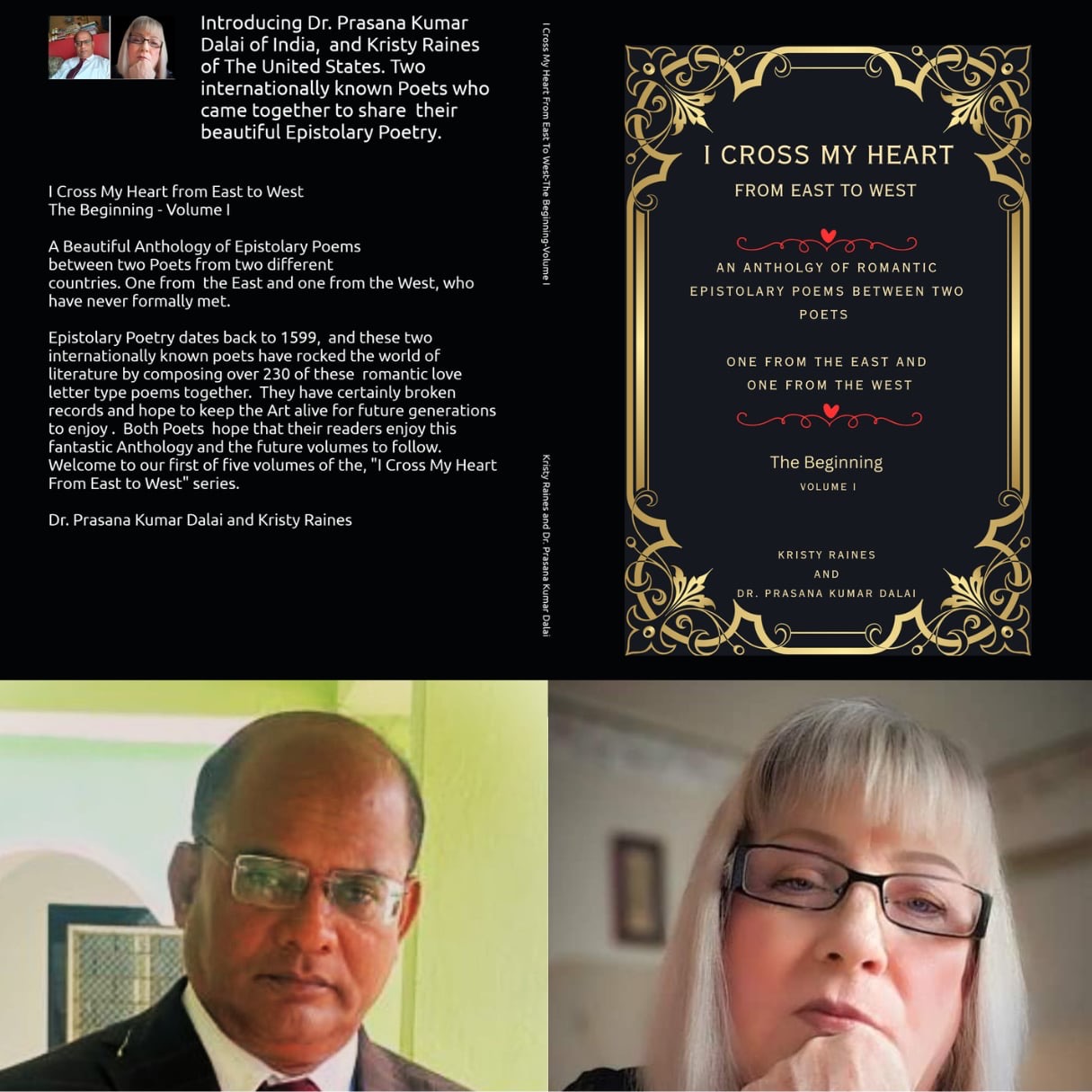
My poem “MORNING DREAM OF MINE” reviewed by honorable reviewer Prof Dr Nirakar Dash Department of English, Assam University
And analysed by honorable analyst & reviewer Raj Kishor Pattnaik.
Humbled & Honoured.
MORNING DREAM OF MINE !
If I steal some light from the blazing sun
Or melody from the whistling wind
If I steal some hues from the rainbow
Or some blessings from the shrines
That won’t fill the emptiness of yours
Rather the world ‘ll treat me strangely
May God stand by you all the time
Sans you I’m lonely in my journey of life
My yard all dull and monsoon dried up
For you’re true morning dream of mine.
©®Dr Prasana Kumar Dalai@India.
Date. Fri, 20 September 2024.
REVIEW
********
The poem,”Morning Dream of Mine” nearly resembles John Donne ‘s “Go and catch a falling star”in which Donne tries to drive home the infidelity of women by using far fetched images. likewise, here in this poem ,Dr Dalai tries to prove the impossibility of his love coming back, which is suggested by “morning dream”. Dreams are dreams and they can never be translated into reality.Imposible feats like stealing light from the burning sun, melody from wind, colour from rainbow and grace of God and so on are related to Donne ‘s imagery, making the poem almost a classic one. His friends treating him in preposterous way,”dull yard”and dry “monsoon” express his loneliness and precarious state of mind. Although short, the poem poem conveys a bulky theme.Very nice creation! Congratulations Prasanna Sir on writing such a splendid poem..Due regards.
ANALYSIS.
***********
Dear Dr. Prasana Kumar Dalai and Prof. Dr. Nirakar Dash, NAMASKAR
I extend my heartfelt congratulations to both of you for the remarkable collaboration between poetry and critique. Dr. Dalai, your poem “Morning Dream of Mine” is a beautiful, evocative expression of longing, and Prof. Dash, your insightful review has added tremendous value to the understanding of this creation. It is an honor to witness such profound literary excellence and mutual respect between a poet and a reviewer. Dr. Dalai’s talent for crafting emotions into verse, paired with Dr. Dash’s sharp analysis, is an inspiring demonstration of the beauty of literature. My sincere appreciation and best wishes to both of you as you continue to enrich the world of poetry and literature.
Warm regards,
—
**Analysis of the Poem “Morning Dream of Mine”**
Dr. Prasana Kumar Dalai’s poem *Morning Dream of Mine* is a delicate yet powerful articulation of emotional longing, unfulfilled desires, and an introspective commentary on love and loneliness. In just eleven lines, Dr. Dalai captures the complexity of human feelings, reflecting both the fragility and the permanence of dreams that can never be realized. The poem’s brevity belies its depth, allowing the reader to reflect upon the larger themes of existential longing and love that remain tantalizingly out of reach.
The poem opens with a hypothetical premise, where the speaker expresses the desire to perform impossible tasks in an attempt to fill the emotional void left by a beloved. The conditional nature of the lines, “If I steal some light from the blazing sun / Or melody from the whistling wind,” suggests that the speaker is contemplating extreme, almost fantastical efforts to mend this emptiness. However, the futility of these attempts is immediately acknowledged by the poet, who admits that even such monumental feats will not suffice: “That won’t fill the emptiness of yours.”
This concept of an unattainable dream is masterfully symbolized in the title and in the closing line: “For you’re true morning dream of mine.” The idea of a “morning dream” is significant here. Morning dreams, often short-lived and fleeting, tend to evaporate upon waking, leaving a lingering sense of loss or yearning for something intangible. By referring to the subject of the poem as a “morning dream,” Dr. Dalai emphasizes the ephemeral nature of the connection — the beloved exists in the poet’s life as a cherished vision, yet it is a vision that can never be fully realized or grasped.
Dr. Dalai employs rich imagery throughout the poem, drawing comparisons between natural phenomena and the emotional landscape of the speaker. The images of “light from the blazing sun,” “melody from the whistling wind,” and “hues from the rainbow” represent elements of the natural world that are both awe-inspiring and unattainable, reinforcing the theme of impossibility. The reference to “some blessings from the shrines” adds a spiritual dimension to the poem, implying that even divine intervention cannot bridge the emotional gap between the speaker and the beloved. Here, the poet subtly invokes a sense of fate or destiny — that some things, despite human effort or divine favor, are simply not meant to be.
The emotional tone of the poem shifts in the second half, where the speaker reflects on the personal consequences of this unfulfilled longing. The line “May God stand by you all the time” shows the poet’s selflessness and deep affection for the subject, despite the speaker’s own loneliness. The focus is not on possessing the beloved but on wishing for their well-being. However, the next line — “Sans you I’m lonely in my journey of life” — starkly contrasts this sentiment, revealing the internal struggle of the speaker. This duality of love, where one both desires the happiness of the other and suffers from their absence, adds emotional complexity to the poem.
The imagery of a “dull yard” and the drying up of the monsoon metaphorically convey the desolation and barrenness felt by the speaker in the absence of the beloved. The monsoon, typically associated with life, renewal, and abundance in Indian culture, here symbolizes the emotional sustenance that the speaker lacks. The “dull yard” further enhances the sense of stagnation, portraying the speaker’s life as barren and devoid of vibrancy without the beloved.
In his review, Prof. Dr. Nirakar Dash expertly draws parallels between Dr. Dalai’s poem and the metaphysical style of John Donne, particularly Donne’s use of far-fetched and imaginative imagery to express complex emotional states. Dr. Dash references Donne’s famous poem *Go and Catch a Falling Star* to highlight the similarity in tone and theme between the two works. Like Donne, who uses impossible tasks to reflect on the unattainable nature of love and fidelity, Dr. Dalai also presents love as an elusive dream, one that cannot be realized through even the most extraordinary efforts.
Dr. Dash’s review captures the essence of *Morning Dream of Mine* beautifully, noting how the speaker’s isolation and sense of futility are conveyed through vivid natural imagery and spiritual references. His observation that the poem, while short, carries a “bulky theme” is particularly astute, as it emphasizes the weight of the emotions packed into such an economical structure. Furthermore, Dr. Dash’s comparison to Donne elevates the poem, placing it in the realm of metaphysical poetry, known for its intellectual and emotional depth.
**Conclusion**
*Morning Dream of Mine* is a poem that masterfully captures the emotional turbulence of unrequited love and the human desire for connection. Through its rich imagery and exploration of unattainable dreams, Dr. Dalai creates a poignant reflection on the intersection of love, loss, and longing. Prof. Dash’s review further enhances the appreciation of the poem by contextualizing it within a broader literary tradition, providing a thoughtful and enlightening perspective that highlights the timeless nature of the themes Dr. Dalai addresses.
This poetic work, combined with the insightful analysis by Prof. Dash, showcases the powerful interplay between creative expression and critical thought, resulting in a literary experience that resonates deeply with readers.



